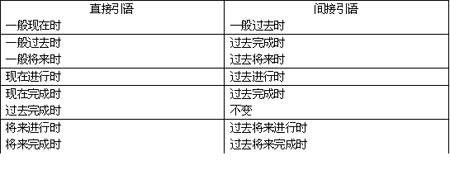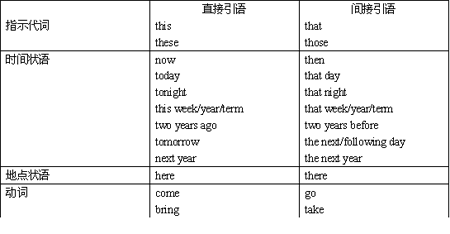高中语法-直接引语与间接引语精讲
(单词翻译:单击)
直接引语与间接引语专题讲座
定义:
直接引语:直接引用别人的原话,并在原话前后加引号。
例:He said1:" It is too late."
间接引语:用自己的话转述别人的话,多数以宾语从句的形式构成。
例:He said it was2 too late.
直接引语与间接引语相互转化时应注意的问题
第一:人称的变化。
主语为第一人称的直接引语,变间接引语时,人称要做相应调整。
例如:
直接引语 She said:" I am hungry."
间接引语 She said she was hungry.
直接引语 Mum said to me:" You must clean your bedroom by yourself3."
间接引语 Mum told me that I had4 to clean my bedroom by myself5.
第二:时态变化
直接引语变间接引语时,间接引语的时态要与主句的时态一致。其规律如下图。
注意:
1.直接引语为客观真理时,间接引语时态不变,仍用一般现在时。
例如:Teacher told us:" The moon moves round the earth6."
Teacher told us the moon moves round the earth.
2.直接引语为一般过去时并且与具体时间状语连用时,间接引语仍用一般过去时。
例如:She said:" I went to England in 1998."
She said she went to England in 1998.
3.主句为一般现在时或一般将来时的时候,间接引语时态不变。
He says:" I bought you a book yesterday."
He says that he bought me a book yesterday.
第三:指示代词、时间状语、地点状语和动词的变化。
第四:句式上的变化
1.陈述句变间接引语时,用that连接。
如:She said:" I am a girl."
She said that she was a girl. (that可以省略)
2.一般疑问句,选择疑问句和反意疑问句变间接引语时,要用陈述语气,并要加连词if或whether。
例如:She asked me:" Are you Mr. Li?"
She asked me if I was Mr. Li.
She asked us:" Do you want to go on a picnic?"
She asked us if we wanted to go on a picnic.
3.特殊疑问句变间接引语要用特殊疑问词引导。
例如:"How much have we spent on petrol7 this year," Susan asked her husband8.
Susan asked her husband how much they had spent on petrol that year.
4.祈使句变间接引语,一改二变三加四去。
一改:said (to) 改为asked或told, ordered等
二变:said to 的宾语或呼语变为asked等的宾语
三加:即在动词原形前加to,使成为动词不定式
四去:去掉please
例:He said to her:" Don't take the book away."
He asked her not take the book away.
5.感叹句变为间接引语
"What awful9 weather it is!" she said.
She complained10 about the awful weather.
"What a bright girl you are." He said to me.
He praised11 me that I was a bright girl.
 收听单词发音
收听单词发音
1
said

|
|
| v.动词say的过去式、过去分词 | |
参考例句: |
|
|
|
2
was

|
|
| v.(is,am的过去式)是,在 | |
参考例句: |
|
|
|
3
yourself

|
|
| pron.你自己 | |
参考例句: |
|
|
|
4
had

|
|
| vbl.have的过去式和过去分词;conj.有 | |
参考例句: |
|
|
|
5
myself

|
|
| pron.我自己 | |
参考例句: |
|
|
|
6
earth

|
|
| n.陆地;大地;地球 | |
参考例句: |
|
|
|
7
petrol

|
|
| n.(英)汽油([美]gasoline) | |
参考例句: |
|
|
|
8
husband

|
|
| n.丈夫 | |
参考例句: |
|
|
|
9
awful

|
|
| adj.极坏的;极讨厌的;令人畏惧的,可怕的;威严的,庄重的;极度的,非常的 | |
参考例句: |
|
|
|
10
complained

|
|
| v.抱怨,诉苦,投诉( complain的过去式和过去分词 );申诉,控诉,抗议;诉说,申诉,控告[后面常跟从句] | |
参考例句: |
|
|
|
11
praised

|
|
| v.称赞( praise的过去式和过去分词 );赞美;颂扬;崇拜 | |
参考例句: |
|
|
|
- 上一篇:外国考官面试时第一印象很重要
- 下一篇:语法精讲-英语里的双重否定句式




